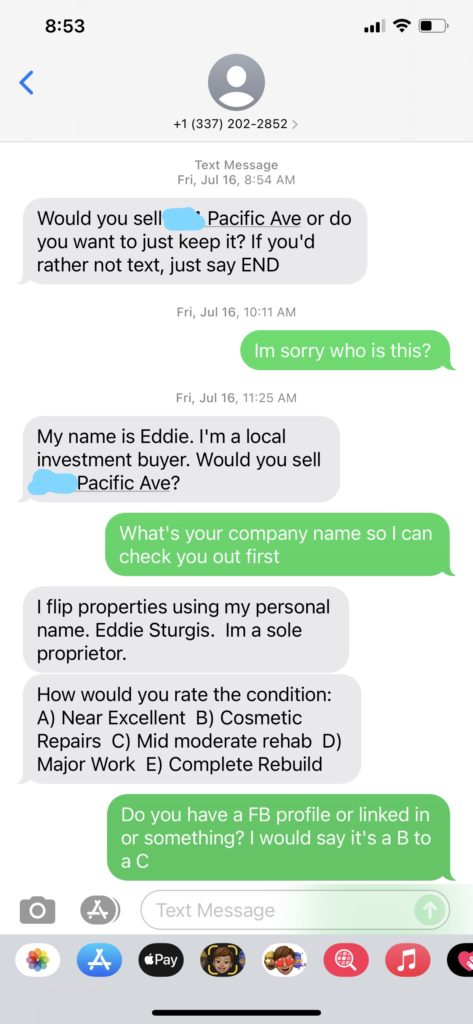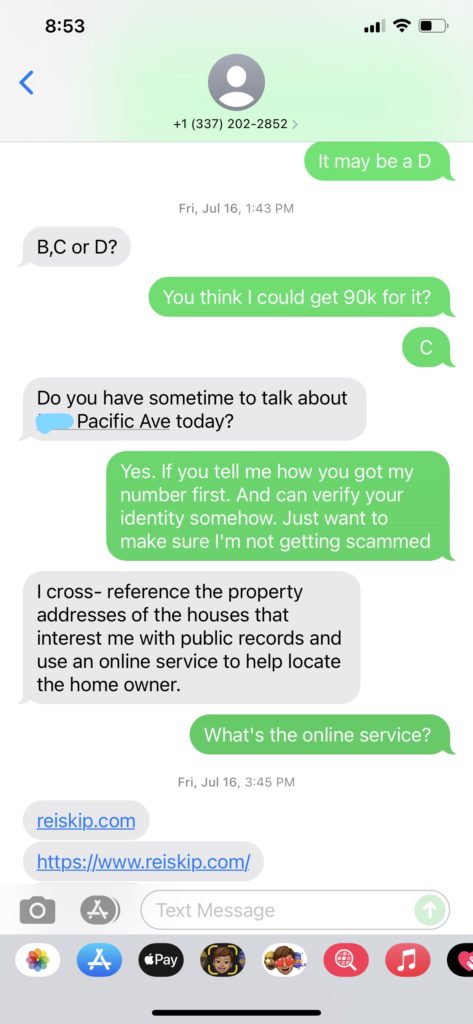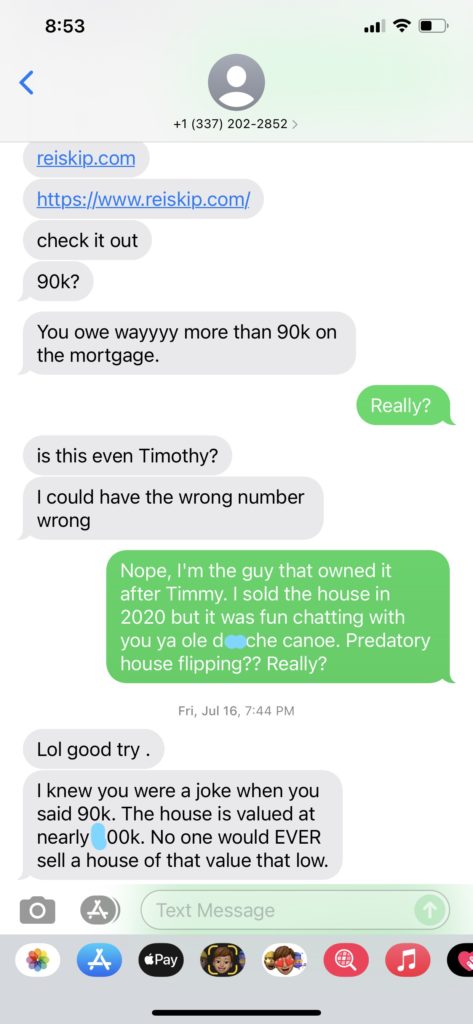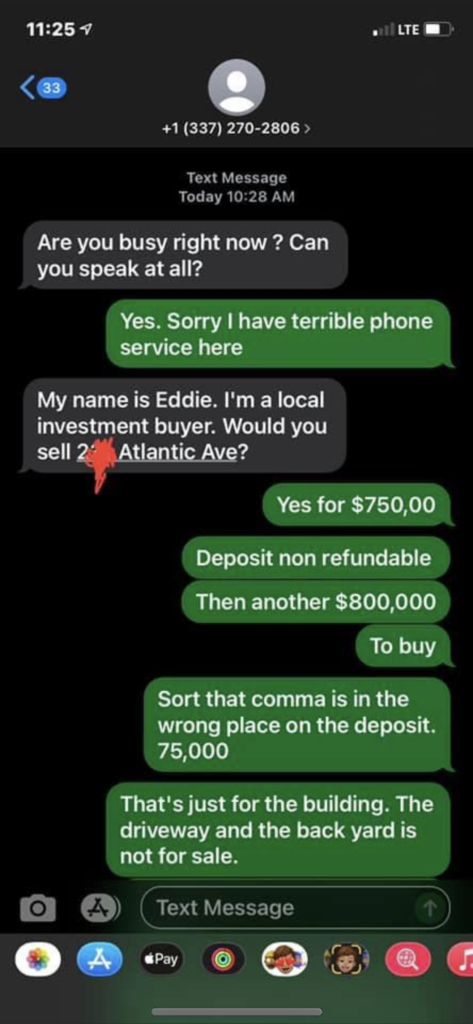So there I was, doing my thing, running some work errands, trying to keep things in order when all of the sudden, I receive a text message from a stranger.
Would you sell 111 Pacific Ave or do you want to just keep it? If you’d rather not text, just say END
A little taken aback and caught off guard by the message, I stopped to ponder this strange request and thought to myself — who the hell is this guy and how did he get my number?
Also a little curious about this eager homebuyer, I decided to do a little due diligence and investigate the message myself.
Whoever this guy was, I wanted to unmask him for cheap, lying, no-good, rotten, four-flushing, low-life, snake-licking, dirt-eating, inbred, overstuffed, ignorant, blood-sucking, dog-kissing, brainless, hopeless, heartless, fat-as*ed, bug-eyed, stiff-legged, spotty-lipped, worm-headed, sack of monkey sh** he is!
And it’s not that I was particularly bothered by what I assume was an automated message (as I receive A LOT of scam calls throughout the day), but I was bothered at the fact that he was able to match my name and former property address with my personal cell phone number.
So, I did what anyone would have done (or at least I hope what anyone would have done) — I led him on!
And, much to my surprise, he took the bait and eventually, after some very impressive virtual acting on my end (applause accepted), cautiously spilled the beans.
Here’s how it all went down and what I found out!
Our Conversation!
When he first texted me, I figured the message was some sort of bot (or maybe some sort of automated message) but I knew at least two things were definitely true— his number and his name were fake!
I was right! (or at least I think so).



As it turns out, the number he texted me from was a Google Voice number, which is pretty much a made-up number that lets you shield your identity. For the older readers in the room, think back to when you were younger and used *67 to make prank phone calls. It’s pretty much the same thing but just more advanced.
And the name? Well, I have no proof that his name isn’t Eddie Sturgis, but rest assured, it’s fake.
Anywho, as you can see by the texts, it took a little convincing to make this guy think I was for real.
And yes, I guess I could have called him, I could have had that conversation or met with him and REALLY led him on, but then again, I didn’t know I’d be writing this article in the future so there wasn’t really a point (but much respect to anyone who does do this because these kinds of people are the worst!).
So, what I did gather, however, is that he used “skip tracing” to get my number. And what is this “skip tracing” you ask?
Well, from what I understand, it’s a super sketchy but entirely legal process to locate someone and get their information.
And just for some added reference here, it’s used by bounty hunters, jail bondsmen, aaanddd predatory house flippers — America’s cream of the crop!
What is Skip Tracing?
So back to the point! What is this skip tracing and what’s the big deal?
Well, by definition (and according to Oxford Languages), skip tracing is “the action or practice of locating people who are missing or have defaulted on a debt, especially as a profession.”
Why call it “SKIP” tracing? — Because when someone’s wanted by an authority or debt collector, you typically don’t say they “left town,” you say they “skipped town” — AKA, someone’s in big trouble and you want to track or “trace” them.
And although it’s primarily a means to collect a debt, it has a number of other uses as well.
It can be used to find a long-lost relative, locate a witness, find a court skipper, find a resource, etc.
And surprisingly, it’s used by just about everyone — bail enforcers, FBI agents, debt collectors, repossession agents, journalists, lawyers, private investigators, and police detectives.
But, what’s interesting about my situation (or anyone who’s had a random stranger text them about their house), is that “skip tracing” wasn’t used to find a fugitive or collect a debt, it was used to find my real estate information — my house, my name, and most shockingly, my cell phone number.
So onto the big question, is this legal?
Is Skip Tracing Legal?
So let me clear, before I jumped on the “this seems really off” bandwagon, I did try and rationalize the concept of skip tracing to some extent.
I thought to myself, “well, we did put our address and phone number in a phone book back in the day, what’s the difference here.”
But then I did some mental gymnastics and came to the conclusion that this is way, way different.
Not only was “Eddie” able to connect MY property information with MY phone number, but he was able to do it with MY ENTIRE NEIGHBORHOOD in a single day! And who knows where this actually stopped — did the whole city receive a text? The whole region? The whole state?
For proof, here’s a screenshot from a former neighbor of mine that was also contacted by “Eddie” (seems like my neighbor had a little fun too).


And that’s what makes all of this so crazy — skip tracing, and the technology that’s built around it, is an entirely legal process to locate someone. And maybe it was originally built with good intentions (big maybe here), but it’s hard to argue that someone like “Eddie” had “good intentions.”
But what makes this even scarier, is that it’s directly linked to big data — and as we’re all learning (from all those late-night Netflix binges), big data has virtually everything on you.
For reference, let’s look at REISKIP, the website where “Eddie” said he retrieved my number.
According to their website, after providing an address, city, and state, they can pretty much scour the internet for information on you.
Here’s how their website describes the process:
Maybe you’ve asked…
“Who’s better… TLO or LexisNexis”?
The truth is, most skip tracing companies are simply reselling phone numbers from only one of the big data companies.
Now imagine if you had a way to get the best numbers from ALL the great data companies.
On your own, this would be nearly impossible and not worth the time it would take you away from growing your business.
So, REISkip does just that (buys data from all the great data companies so you don’t have to), and a WHOLE lot more….
Our mission to provide you the best numbers possible doesn’t stop there….
We scour deep-web indexes for numbers and relationships to add to your list.
Finally, we use our proprietary STT technology to pick the top phone numbers from the data we buy and the data we found.
There’s some advanced machine learning gobbly-gook we left out, but you get the picture…
To summarize the above, REISkip (and probably every other skip tracing company) basically buys data from data collecting companies (also called data brokers) and then provides that information to the requestor. And in my case, the requestor was a house flipper.
So who cares, everyone is into House Flipping
Before I get started here, I’m not trying to say that buying an old, fallen-down house and fixing it up and reselling is a bad thing in itself.
After all, it’s the way the system (as in the market) works and there’s basically an entire television channel dedicated to the idea of it.
But what I am saying is that there are people out there who make a profession out of this and prey upon innocent people. They make it a full-time job to not only hunt down cheap properties, but hunt down cheap properties with people they suspect can be tricked.
Take “Eddie” for example. Eddie wasn’t trying to buy my house and make a little profit. No, Eddie was fishing for a distressed homebuyer whom he suspected was trickable — and he had virtual access to a neighborhood of 20,000 people to do it!
His intention was to lie as much as possible and convince a vulnerable homeowner that their property wasn’t worth anything.
He was going to either use (1) a “flopping” real estate strategy (basically a slew of scams that uses straw buyers, etc. and flirt with illegality), or (2) he was just going to buy it cheap, make some minor repairs, and sell it at market rate or higher.
And again, buying a house and selling it isn’t bad in itself — that’s not what I’m trying to say here — but when an individual is allowed to target certain homebuyers based on whatever variable they choose (think race or age) and do so on a massive scale using very LEGAL and accessible technology, then I’d say there are some serious red flags.
And unfortunately, there doesn’t appear to be a concerted effort to stop it.
Here’s the Point
In conclusion, there are basically three points I’m trying to make here:
- Predatory house flippers like “Eddie” are horrible.
- Skip tracing (technology) is indeed legal but is sometimes used for illegal or extremely unethical practices.
- Skip tracing has allowed people like “Eddie” to target and prey upon vulnerable people by the thousands.
Am I saying that ALL skip tracing is bad? No, that’s not what I’m saying at all.
There seem to be some pretty legitimate reasons for using it — such as finding a long, lost relative or locating a witness in a criminal trial — but the idea that skip tracing can be used for house flipping on such a massive scale is more than just unsettling, it’s flat out damaging.
It gives an unethical person a means to do unethical things in a perfectly legal way.
And the result? The people targeted lose everything — they lose generational wealth, a social structure, a family structure, and most damaging of all, a simple roof over their head.
So, if you ever receive a text from a cheap, lying, no-good, rotten, four-flushing, low-life, snake-licking, dirt-eating, inbred, overstuffed, ignorant, blood-sucking, dog-kissing, brainless, hopeless, heartless, fat-as*ed, bug-eyed, stiff-legged, spotty-lipped, worm-headed, sack of monkey sh** then I hope you waste his time and lead him on.
Or at the very least, give your congressman a call and tell them what’s going on. The faster we spread awareness, the faster we can shut these guys down.
Because after all, no one wants a stranger texting them about their house. I’m willing to bet it’s an easy sell.

Millennial Cities
Want free articles, news, tools, and information? Subscribe below and we’ll add you to the list!
